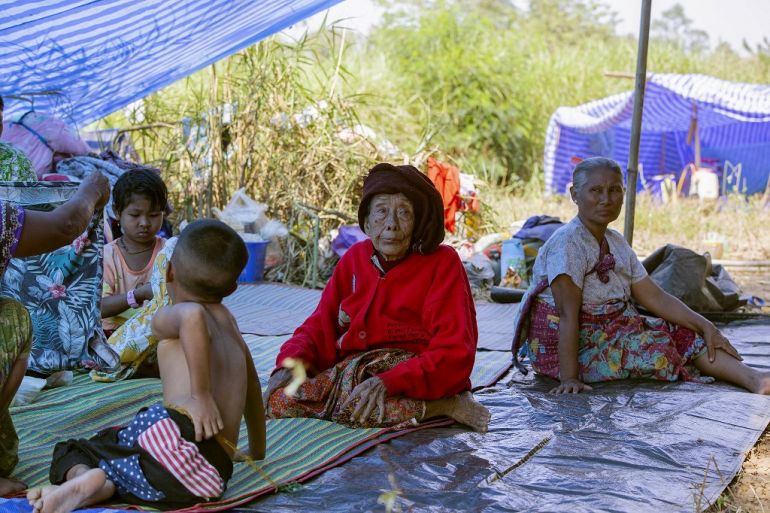UN seeks Thailand’s help to halt Myanmar crisis deterioration
Discord within ASEAN over how to deal with Myanmar is delaying a crucial meeting of the region’s foreign ministers.

A United Nations envoy has called for Thailand’s support to prevent an escalation of the crisis in neighbouring Myanmar and welcomed assurances that refugees fleeing Myanmar military operations would be protected by the Thai government.
Noeleen Heyzer, the UN secretary-general’s special envoy on Myanmar, made the appeal to Thai Prime Minister Prayuth Chan-ocha as the Myanmar situation increased discord within ASEAN (Association of Southeast Asian Nations) and caused the postponement of a ministers’ meeting set for this week.
Keep reading
list of 3 itemsMyanmar military replaces air force chief amid bombing campaign
Fleeing violence in Myanmar, thousands camp along Thai border river
Heyzer is courting support for international efforts to help displaced people and press Myanmar’s military rulers to commit to a five-point peace plan agreed to with fellow ASEAN members last April.
“The prime minister has an important role in preventing further deterioration of the crisis in Myanmar, where an implosion would bring further instability to an already volatile border area,” Heyzer said in a statement on Monday.
Myanmar’s military has longstanding ties with Thailand, which experts say has been measured with its criticism of the military due to concerns that it could be flooded with refugees if the Myanmar army steps up operations against opponents.
Thousands of Myanmar civilians have fled into Thailand since clashes near the border erupted after a coup last year and official figures say more than 1,300 people are still in a Thai shelter.
Myanmar’s military has been fighting on multiple fronts since seizing power last year, cracking down with deadly force on protests while intensifying operations against ethnic minority armies and newly formed militias allied with the overthrown government, displacing thousands of civilians.
According to the Mizzima news website, as many as 50,000 have been displaced due to the recent military offensive in the country.
On Tuesday, there were reports on social media of military troops carrying out a raid in Monywa township in the Sagaing Division the day before.
The military has defended the operations as necessary to fight “terrorists”.
Thai Prime Minister Prayuth, a retired general who led a coup in 2014, said Myanmar’s problems were complex and its situation should be addressed “gradually with understanding and through building trust with Myanmar’s leader”.
Prayuth told Heyzer that Thailand had a “humanitarian area” and refugees were only being returned on a voluntary basis.
Several international organisations have told Reuters news agency that they have no access to that humanitarian area.
Ratchada Thanadirek, a government spokeswoman, declined to comment on the issue but said Thailand provides assistance based on international humanitarian principles.
Crisis as 50,000 civilians displaced by fighting in Myanmar’s #Karen State | Mizzima #Myanmar News and Insight https://t.co/CEr5rkF1wE pic.twitter.com/k9TYHUnzdV
— Mizzima News (@MizzimaNews) January 18, 2022
Foreign ministers meeting delayed
Meanwhile, friction over how to deal with Myanmar continues months after ASEAN took the unprecedented step of sidelining Myanmar military chief Min Aung Hlaing from its leaders’ summit following the coup and the deadly crackdown on protesters.
Indonesian foreign ministry official Abdul Kadir Jailani said the issue of Myanmar attending ASEAN events remains unresolved.
“It must be admitted that time is still needed to unite views,” Jailani, the ministry’s director-general for Asian, Pacific and African affairs, told reporters.
However, Cambodia’s postponement of this week’s opening meeting of its term as ASEAN chairman was understandable, he added, since the Omicron coronavirus variant remains a threat.
Cambodia had cited travel difficulties that prevented the attendance of some foreign ministers when it postponed the meeting last week.
Cambodia has indicated it wants to engage the military rulers of Myanmar and had invited its foreign minister, retired Colonel Wunna Maung Lwin, to the ASEAN opening meeting, two diplomatic sources told Reuters.
In recent days, Malaysia’s foreign minister, Saifuddin Abdullah, and Singapore Prime Minister Lee Hsien Loong have opposed the idea of inviting the military, as it had made no progress on an agreed five-point ASEAN “consensus” on resolving the Myanmar crisis.
On Friday, Lee told ASEAN chair and Cambodian counterpart Hun Sen that any change in its Myanmar policy “had to be based on new facts”.